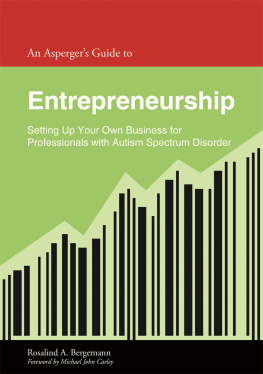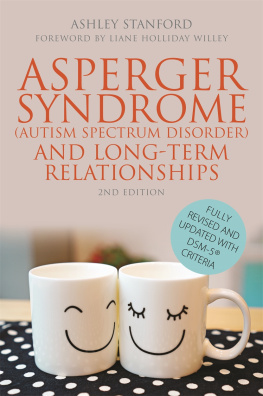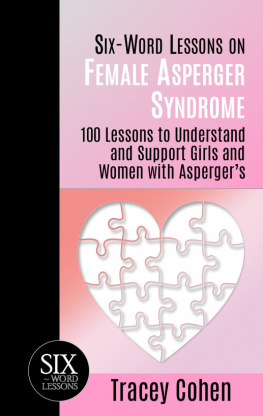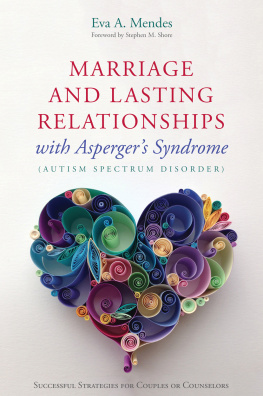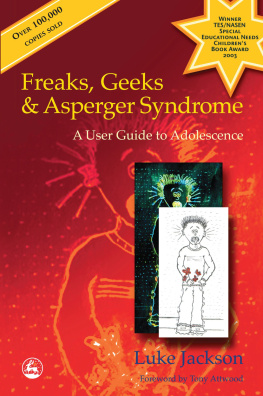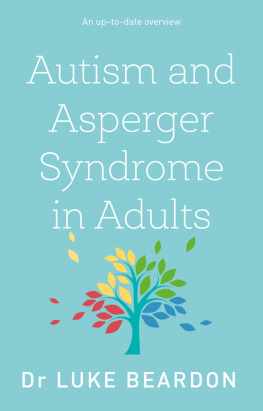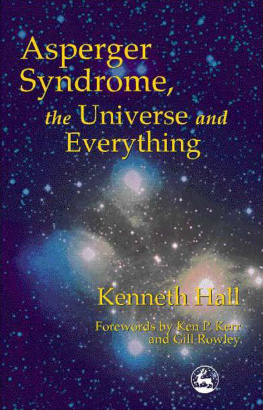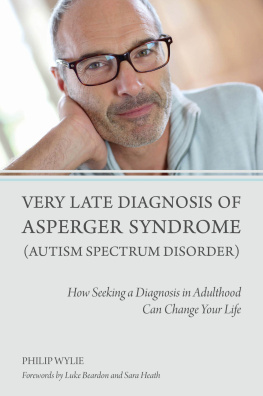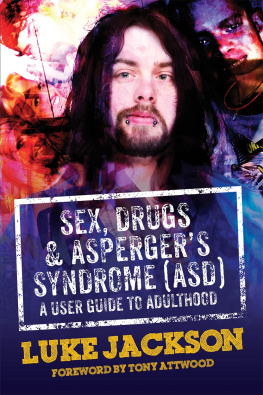Falk Dean - Geeks, Genes, and the Evolution of Asperger Syndrome
Here you can read online Falk Dean - Geeks, Genes, and the Evolution of Asperger Syndrome full text of the book (entire story) in english for free. Download pdf and epub, get meaning, cover and reviews about this ebook. year: 2018, publisher: Lightning Source Inc, genre: Children. Description of the work, (preface) as well as reviews are available. Best literature library LitArk.com created for fans of good reading and offers a wide selection of genres:
Romance novel
Science fiction
Adventure
Detective
Science
History
Home and family
Prose
Art
Politics
Computer
Non-fiction
Religion
Business
Children
Humor
Choose a favorite category and find really read worthwhile books. Enjoy immersion in the world of imagination, feel the emotions of the characters or learn something new for yourself, make an fascinating discovery.

- Book:Geeks, Genes, and the Evolution of Asperger Syndrome
- Author:
- Publisher:Lightning Source Inc
- Genre:
- Year:2018
- Rating:5 / 5
- Favourites:Add to favourites
- Your mark:
- 100
- 1
- 2
- 3
- 4
- 5
Geeks, Genes, and the Evolution of Asperger Syndrome: summary, description and annotation
We offer to read an annotation, description, summary or preface (depends on what the author of the book "Geeks, Genes, and the Evolution of Asperger Syndrome" wrote himself). If you haven't found the necessary information about the book — write in the comments, we will try to find it.
Falk Dean: author's other books
Who wrote Geeks, Genes, and the Evolution of Asperger Syndrome? Find out the surname, the name of the author of the book and a list of all author's works by series.
Geeks, Genes, and the Evolution of Asperger Syndrome — read online for free the complete book (whole text) full work
Below is the text of the book, divided by pages. System saving the place of the last page read, allows you to conveniently read the book "Geeks, Genes, and the Evolution of Asperger Syndrome" online for free, without having to search again every time where you left off. Put a bookmark, and you can go to the page where you finished reading at any time.
Font size:
Interval:
Bookmark:
Geeks, Genes, and the Evolution of Asperger Syndrome

Frontispiece. Self-portrait Eve drew when she was eleven years old.
Syndrome
Dean Falk and Eve Penelope Schofield

2018 by Dean Falk and Eve Penelope Schofield
All rights reserved. Published 2018
Printed in the United States of America
Library of Congress Cataloging-in-Publication Data
Names: Falk, Dean, author. | Schofield, Eve Penelope, 1991 author.
Title: Geeks, Genes, and the Evolution of Asperger Syndrome / Dean Falk and Eve Penelope Schofield.
Description: Albuquerque: University of New Mexico Press, 2018. | Includes bibliographical references and index. |
Identifiers: LCCN 2017026650 (print) | LCCN 2017047256 (ebook) | ISBN 9780826356932 (E-book) | ISBN 9780826356925 (pbk.: alk. paper)
Subjects: LCSH: Schofield, Eve Penelope, 1991Health. | Aspergers syndromePatientsBiography. | Aspergers syndromeResearch.
Classification: LCC RC553.A88 (ebook) | LCC RC553.A88 F35 2018 (print) | DDC 616.85/8832dc23
LC record available at https://lccn.loc.gov/2017026650
Cover photograph courtesy of Sarah Nichols
Cover designed by Lisa Tremaine
Interior designed by Felicia Cedillos
Dean: In loving memory of Alfred and Jane Falk.
Eve: To all who were at the Kingsweston Centre at Oasis Academy, Brightstowe, for helping me to grow into my skin.
If you met my twenty-six-year-old granddaughter and coauthor of this book, Eve, you would probably be struck by her large vocabulary and odd mannerisms. Perhaps you wouldnt be able to put your finger on it, but if you were familiar with Asperger syndrome (AS) it would not take long for you to wonder if Eve has it, which she does. Like other people with AS, Eve had to be taught how to make eye contact and engage in small talk. As a young adult, she still has difficulty grasping the nuances of other peoples tone of voice (and modulating her own) and understanding the thoughts and desires of others (an ability that psychologists call theory of mind). Despite these challenges, Eve read precociously as a child, and I am proud to say she recently earned a bachelor of arts degree in creative writing and publishing from Bath Spa University in England. As you will see, Eve has avid interests in Japan, anime, and fantasy-based fiction, interests she will cheerfully share, more or less nonstop, with anyone who will listen.
I am a paleoanthropologist who has spent the last four decades researching the evolution of the human brain and cognition, and I have a longstanding interest in how and why language, music, art, and science emerged in our ancestors. I have been privileged to study materials ranging from the fossilized remnants of the brains of our prehistoric relatives to the cerebral cortex of Albert Einstein. The research, clinical politics, and controversy that continue to engulf AS have been on my radar since Eve was first diagnosed with it when she was nine years old.
As is well known, Aspergers Disorder was folded into Autism Spectrum Disorder along with certain other developmental disorders in the most recent revision of the Diagnostic and Statistical Manual of Mental Disorders published by the American Psychiatric Association. there is a time for lumping individuals into larger groups (such as primates) and a time for splitting them into narrower categories (such as monkeys, apes, and humans). In other words, there is no one right way to classify organisms into groups. The same may be said for autism. Sometimes it is useful to think of it as consisting of one large spectrum, for example, when considering its global prevalence, which we will do later in the book. At other times, it makes more sense to recognize that the broad spectrum consists of different kinds of autism.
For example, the estimated 50 percent of autists who remain mute throughout their lives can be distinguished from those who eventually develop language. The latter group may be divided further into individuals who were delayed in the development of language compared to typically developed children (often described as having high-functioning autism, or HFA) and autists who were not delayed in acquiring language (identified in the now-discarded DSM-IV as having Aspergers Disorder). Although all these groups are worthy of investigation in and of themselves, we focus primarily on AS and HFA, not because other kinds of autism arent important and interesting but because AS and, to some extent, HFA are well suited for evolutionary analyses.
The vocabulary one uses for autism is important because, among other reasons, the label a child receives will likely influence his or her future. With respect to the terms low-functioning autism and high-functioning autism, for example, science writer Nicholette Zeliadt observes that either label can be limiting: It might prevent one child from participating in activities she wants to do, or exclude another from getting the services he needs. As noted, this book synthesizes information from many scientific studies that have focused on AS and HFA. We use the terms and definitions (including for HFA) employed by the authors of the various studies discussed in this book, although we are sympathetic with the viewpoint that many individuals who have been diagnosed with low-functioning autism (who are not a focus of this book) may, in fact, function well in day-to-day aspects of their lives.
A word about some of the other terms used in this book. We prefer Asperger syndrome to the DSM-IV label of Aspergers Disorder (but retain the latter when the context calls for it), partly because Hans Asperger himself preferred syndrome, as indicated when he wrote about Asperger syndrome, as it is now known. and typically developed are labels for unaffected people who frequently comprise the comparison (control) groups in autism studies.
Because Aspies is more concise than phrases such as persons with Asperger syndrome or individuals with AS, and because Eve prefers it, Aspie(s) is used widely, but not exclusively, throughout the book. By adopting this term, we follow autism advocate Judy Singer, who used it when she noted in 1999, The people who band together under this category prefer to name their condition as AS, and themselves as autistics, and sometimes, comfortably, as aspies, to distinguish themselves from those they have dubbed the NTsNeurotypicals.autistics, autists, high-functioning autism, neurotypical, and typically developed are intended to be respectful. So is our use of geeks to identify highly talented technical-minded individuals.
In each chapter, I discuss the latest findings related to a specific facet of AS (and, where possible, HFA), such as the cognitive, genetic, or neurological underpinnings of these conditions. Put simply, my goal is to understand how AS fits within the evolutionary-developmental (evo-devo) framework that caused humans to emerge as the most cognitively advanced species on the planet. Eve, on the other hand, writes about experiences she has had that are relevant to some aspect of each chapters scientific content. (Unlike her grandmother, Eve uses British spellings in her parts of the book.) Because her opinions are those of only one person, her parts of the book are obviously not meant to represent all people with AS. They do, however, give a feel for what it is like to be an Aspie. In the last chapter, Eve offers suggestions about how parents of children with AS and HFA can help them have a better future.
Next pageFont size:
Interval:
Bookmark:
Similar books «Geeks, Genes, and the Evolution of Asperger Syndrome»
Look at similar books to Geeks, Genes, and the Evolution of Asperger Syndrome. We have selected literature similar in name and meaning in the hope of providing readers with more options to find new, interesting, not yet read works.
Discussion, reviews of the book Geeks, Genes, and the Evolution of Asperger Syndrome and just readers' own opinions. Leave your comments, write what you think about the work, its meaning or the main characters. Specify what exactly you liked and what you didn't like, and why you think so.

